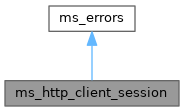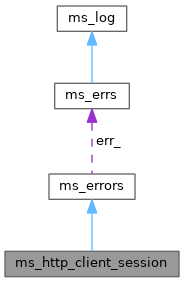This gives access to a Mascot session so searches may be submitted. More...
#include <ms_http_client_session.hpp>


Public Types | |
| enum | SequenceShowOptions { SHOW_PI = 0x0001 , SHOW_TITLE = 0x0002 , SHOW_LENGTH = 0x0004 , SHOW_SEQUENCE = 0x0008 , SHOW_REFERENCE = 0x0010 , SHOW_NONE = 0 , SHOW_ALL = 0xFFFF } |
| Information to include in a request for sequence data. More... | |
Public Member Functions | |
| ms_http_client_session () | |
| Create an empty session. | |
| ms_http_client_session (const ms_http_client_session &src) | |
| ms_http_client_session (const ms_http_helper connection, const std::string sessionId) | |
| Construct a session object that can be used to access the Mascot Server. | |
| virtual | ~ms_http_client_session () |
| Destructor. | |
| void | appendErrors (const ms_errors &src) |
| Copies all errors from another instance and appends them at the end of own list. | |
| void | clearAllErrors () |
| Remove all errors from the current list of errors. | |
| void | copyFrom (const ms_errors *right) |
| Use this member to make a copy of another instance. | |
| void | copyFrom (const ms_http_client_session *right) |
| const ms_errs * | getErrorHandler () const |
| Retrive the error object using this function to get access to all errors and error parameters. | |
| bool | getIsPermitted (ms_security_tasks::TASKID taskType, bool &returnIsPermitted) |
| Returns true if the security token is allowed for this session. | |
| bool | getIsXmlUploadedList (const std::vector< std::string > &taskIds, std::vector< int > &xmlUploaded) |
| Queries if the specified searches have had Mascot Distiller quantitation XML uploaded. | |
| int | getLastError () const |
| Return the error description of the last error that occurred. | |
| std::string | getLastErrorString () const |
| Return the error description of the last error that occurred. | |
| bool | getSequenceFile (const std::string &database, const std::vector< std::string > &accessionNames, const std::vector< int > &accessionFrames, const std::string &filename, const SequenceShowOptions options=SHOW_ALL) |
| Download sequence information for a set of accessions. | |
| std::string | getSessionID () const |
| Returns the Mascot session ID. | |
| bool | isValid () const |
| Call this function to determine if there have been any errors. | |
| bool | logout () |
| Close the Mascot session. | |
| ms_http_client_session & | operator= (const ms_http_client_session &right) |
| bool | submitSearch (ms_http_client_search &returnTask, const std::string &httpHeader, const std::string &prologue, const std::string &filename, const std::string &epilogue, ms_http_helper_progress &progress, bool batch=false) |
| Submit a search to the Mascot server. | |
This gives access to a Mascot session so searches may be submitted.
Create an ms_http_client_session object by calling: ms_http_client::userLogin and this object can then be used to submit a search by calling ms_http_client_session::submitSearch
Multiple searches and data requests may be made using the same ms_http_client_session. When access to the Mascot Server is complete, call logout
Server side documentation for sessions is here
| enum SequenceShowOptions |
Information to include in a request for sequence data.
Add the flags together to include multiple data items per sequence. Pass the enum to getSequenceFile
See Using enumerated values and static const ints in Perl, Java, Python and C#.
Create an empty session.
Create an empty session. This is normally passed to ms_http_client::userLogin to populate it.
| ms_http_client_session | ( | const ms_http_helper | connection, |
| const std::string | sessionId | ||
| ) |
Construct a session object that can be used to access the Mascot Server.
This is used internally by ms_http_client and should not normally be called by a client application.
| connection | The associated ms_http_helper. |
| sessionId | The Mascot Server session ID. |
|
virtual |
Destructor.
This tidies up any HTTP connection that is still open by calling logout() if necessary.
| ms_http_client_session | ( | const ms_http_client_session & | src | ) |
| src | is the source to initialise from |
|
inherited |
Copies all errors from another instance and appends them at the end of own list.
| src | The object to copy the errors across from. See Maintaining object references: two rules of thumb. |
|
inherited |
Remove all errors from the current list of errors.
The list of 'errors' can include fatal errors, warning messages, information messages and different levels of debugging messages.
All messages are accumulated into a list in this object, until clearAllErrors() is called.
See Error Handling.
|
inherited |
Use this member to make a copy of another instance.
| right | is the source to initialise from |
| void copyFrom | ( | const ms_http_client_session * | right | ) |
| right | is the source to initialise from |
|
inherited |
Retrive the error object using this function to get access to all errors and error parameters.
See Error Handling.
| bool getIsPermitted | ( | ms_security_tasks::TASKID | taskType, |
| bool & | returnIsPermitted | ||
| ) |
Returns true if the security token is allowed for this session.
Permissions are set in the Mascot Security Administration pages.
The most relevant tokens for third party clients are:
See Multiple return values in Perl, Java, Python and C#.
| [in] | taskType | The security token being queried. |
| [out] | returnIsPermitted | Returns true if the security task type is permitted on this session, false if not. |
| bool getIsXmlUploadedList | ( | const std::vector< std::string > & | taskIds, |
| std::vector< int > & | xmlUploaded | ||
| ) |
Queries if the specified searches have had Mascot Distiller quantitation XML uploaded.
The query can be for any number of searches. If the number of searches is too large for a single query to the server then multiple queries will be made.
See Multiple return values in Perl, Java, Python and C#.
| [in] | taskIds | The task IDs of the searches. |
| [out] | xmlUploaded | Set to the same size as taskIds. Non-zero if Mascot Distiller quantitation XML has been uploaded for that search. |
|
inherited |
Return the error description of the last error that occurred.
All errors are accumulated into a list in this object, until clearAllErrors() is called. This function returns the last error that occurred.
See Error Handling.
|
inherited |
Return the error description of the last error that occurred.
All errors are accumulated into a list in this object, until clearAllErrors() is called. This function returns the last error that occurred.
See Error Handling.
| bool getSequenceFile | ( | const std::string & | database, |
| const std::vector< std::string > & | accessionNames, | ||
| const std::vector< int > & | accessionFrames, | ||
| const std::string & | filename, | ||
| const SequenceShowOptions | options = SHOW_ALL |
||
| ) |
Download sequence information for a set of accessions.
The retrieved file is in XML.
If the database is not active on the Mascot server then the body opf the XML document will be empty.
The frame number is used if the frames collection has an entry for a name and it is not -1.
See Using STL vector classes vectori, vectord and VectorString in Perl, Java, Python and C#.
| database | The name of the database on the Mascot server fromn which the data is to be retrieved. |
| accessionNames | A collection of accession names for the peptides or NA sequences to be retrieved. |
| accessionFrames | A collection of frames. This only has meaning for an NA database. 0 means return the NA sequence. A number between 1 and 6 means translate the NA sequence in that frame and return the AA sequence. |
| filename | The name of the local file to be populated with the retrieved information. S |
| options | The types of information to be included in the output file. |
| std::string getSessionID | ( | ) | const |
Returns the Mascot session ID.
This may change during any call that accesses the Mascot server as the session on the server may have expired and a new one will be automatically created.
|
inherited |
Call this function to determine if there have been any errors.
This will return true unless there have been any fatal errors.
See Error Handling.
| bool logout | ( | ) |
Close the Mascot session.
Called automatically by the destructor.
You must login again to create a new Mascot session in order to use the Mascot server again.
| ms_http_client_session & operator= | ( | const ms_http_client_session & | right | ) |
| right | is the source to initialise from |
| bool submitSearch | ( | ms_http_client_search & | returnTask, |
| const std::string & | httpHeader, | ||
| const std::string & | prologue, | ||
| const std::string & | filename, | ||
| const std::string & | epilogue, | ||
| ms_http_helper_progress & | progress, | ||
| bool | batch = false |
||
| ) |
Submit a search to the Mascot server.
The search is submitted using a POST request to the search executable (normally nph-mascot.exe) on the Mascot Server.
This function makes http calls to the Mascot Server to create a unique taskID and this is returned in the ms_http_client_search object and can be accessed using ms_http_client_search::getSearchTaskID . The name of the search application in use on the Mascot server is also retrieved from the server as part of this process.
The search parameters and peak list are combined into a MIME format file using the prologue, filename and epilogue parameters.
This function normally only returns when all the data has been sent. If the abort submission function is called then it will stop sending data at a convenient point and return early.
The logging level and logging file (if any) in the returnTask are set to be the same as in the ms_http_client_session object. Any existing errors in returnTask are cleared.
| returnTask | The search object that can be used to monitor progress and then retrieve results. See Maintaining object references: two rules of thumb. |
| httpHeader | The HTTP header line, specifying the content type and the MIME separator string. For example: "Content-Type: multipart/mixed; boundary=---------FormBoundary4C9ByKKVofH" |
| prologue | Text sent as the first part of the content of the HTTP POST. This will normally contain the search parameters. For an example, see http_client.pl |
| filename | The name of a file, the content of which is sent after the prologue text and before the epilogue text. This can be an MGF or other peak list data file. |
| epilogue | Text sent as the last part of the content of the HTTP POST. For example, "-----------FormBoundary4C9ByKKVofH--" |
| progress | The progress information is maintained as the data is uploaded to the server. The upload may be aborted by calling setAbort. See Maintaining object references: two rules of thumb. |
| batch | If true, the search will be submitted with the -batch switch, which will keep the search alive on IIS if the connection is broken. This can only be used with Mascot 2.5 or later, and will cause an error if set to true when submitting a search on an older version of Mascot [default=false]. |